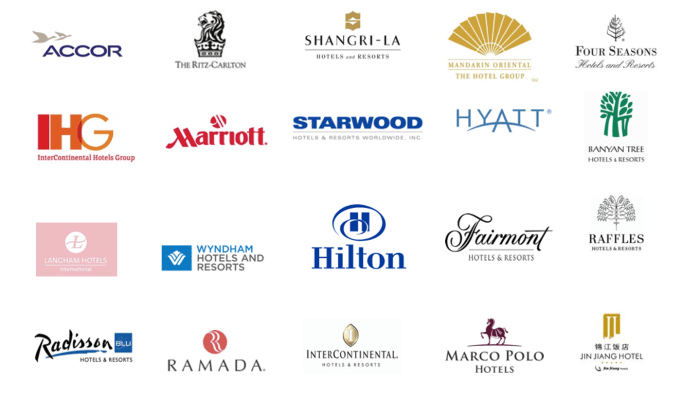Top Luxury Hotel Brands represent the pinnacle of hospitality, offering more than just accommodation; they curate experiences. This exploration delves into the defining characteristics of luxury hotels, examining the factors that set them apart and the strategies employed by leading brands to maintain their prestigious positions. We’ll journey through global brand landscapes, analyzing marketing approaches, guest experiences, and the ever-evolving future of this exclusive sector.
From the meticulous service and opulent amenities to the architectural marvels and innovative design features, we’ll uncover what truly constitutes a luxury hotel stay. This analysis will consider various price points, target audiences, and the unique selling propositions that distinguish each brand, offering a comprehensive understanding of this fascinating industry.
Defining “Luxury” in the Hotel Industry: Top Luxury Hotel Brands
Luxury in the hotel industry transcends mere opulence; it’s a meticulously crafted experience encompassing exceptional service, unparalleled amenities, and an overall atmosphere of refined elegance. It’s about exceeding expectations and creating unforgettable memories for the discerning traveler. This definition is subjective and varies based on individual preferences and cultural contexts, yet certain core elements consistently define the luxury hotel experience.
The key characteristics differentiating luxury hotels from other accommodations lie in the meticulous attention to detail and the personalized service provided. It’s not just about the physical attributes, but also the intangible aspects that create a sense of exclusivity and pampering. This is achieved through a combination of high-quality materials, sophisticated design, exceptional staff training, and a commitment to exceeding guest expectations at every touchpoint.
The overall aim is to provide an experience that feels both luxurious and effortless.
Tangible and Intangible Elements of Luxury, Top Luxury Hotel Brands
Tangible elements encompass the physical aspects readily observable by guests. These include high-thread-count linens, lavish bathrooms with premium toiletries, spacious and elegantly designed rooms, state-of-the-art technology, and exquisite dining options. Intangible elements, however, are equally crucial. These encompass personalized service, anticipatory attention to guest needs, a sense of privacy and exclusivity, and the overall atmosphere of calm and sophistication.
A staff that anticipates needs before they are even voiced, a seamless check-in/check-out process, and a consistently high level of personalized service are hallmarks of a truly luxurious experience. For example, a luxury hotel might offer a complimentary shoe shine service or a curated selection of local artisanal products in the room. The subtle details often make the biggest impact.
Price Points Within the Luxury Hotel Segment
The luxury hotel market encompasses a wide range of price points, reflecting varying levels of service, amenities, and location. Budget-conscious luxury travelers might find excellent value in boutique hotels or smaller, independent properties offering high-quality service at a slightly lower price point than the major luxury hotel brands. Mid-range luxury hotels typically offer a balance between price and amenities, while high-end luxury hotels represent the pinnacle of opulence and exclusivity, with price tags to match.
The most expensive hotels often feature unique locations, unparalleled service levels, and exclusive amenities such as private butlers or dedicated concierge services. For example, a night’s stay in a standard room at a high-end luxury hotel in a major city could easily range from $800 to several thousand dollars, while a comparable room at a mid-range luxury hotel might cost between $300 and $800.
Comparison of Luxury Hotel Aspects
| Aspect | Budget Luxury | Mid-Range Luxury | High-End Luxury |
|---|---|---|---|
| Service | Excellent, personalized service, but perhaps less anticipatory | Highly personalized and anticipatory service | Impeccable, proactive service with dedicated staff (butlers, concierge) |
| Amenities | High-quality linens, comfortable rooms, basic spa facilities | Extensive amenities, including spas, fitness centers, multiple dining options | Extensive amenities, exclusive experiences (private chefs, chauffeured cars), high-end spa treatments |
| Location | May be located slightly outside the city center or in less prominent areas | Typically located in desirable areas, often with easy access to attractions | Prime locations in the most exclusive and desirable parts of the city |
| Price Point | $200-$500 per night | $500-$1500 per night | $1500+ per night |
Top Luxury Hotel Brands
The global luxury hotel market is a fiercely competitive arena, with brands vying for the attention of discerning travelers seeking unparalleled experiences. This overview examines the leading players, analyzing their unique strengths, target audiences, and geographic reach. Understanding these dynamics provides valuable insight into the evolution and future of luxury hospitality.
Top 10 Luxury Hotel Brands: A Global Ranking
Defining a definitive “top 10” is inherently subjective, as rankings vary depending on the weighting of criteria like reputation, awards, and market capitalization. However, consistently high-ranking brands across multiple reputable sources include a combination of established names and newer entrants. The following list represents a consensus view, acknowledging that minor shifts in position are possible based on different methodologies.
The unique selling propositions of each brand are crucial to their success and are highlighted below.
- Four Seasons Hotels and Resorts: Known for impeccable service and consistent quality across its global portfolio.
- The Ritz-Carlton: Renowned for its legendary service and attention to detail, often associated with classic elegance.
- The Peninsula Hotels: A collection of sophisticated hotels emphasizing exceptional location and personalized experiences.
- Mandarin Oriental Hotel Group: Blends Asian hospitality traditions with modern luxury, offering a unique cultural perspective.
- St. Regis Hotels & Resorts: Offers a distinctly opulent experience, often characterized by lavish amenities and bespoke services.
- Rosewood Hotels & Resorts: Focuses on creating unique, locally-inspired experiences within stunning destinations.
- Belmond: A collection of luxury hotels, trains, and cruises, known for its exclusive destinations and immersive travel experiences.
- One&Only Resorts: Characterized by their exquisite locations, often in secluded and breathtaking settings.
- Aman Resorts: Famous for its minimalist aesthetic, serene atmosphere, and commitment to privacy and tranquility.
- Park Hyatt: Offers a blend of sophisticated elegance and modern luxury, often located in prime urban locations.
Unique Selling Propositions of Top Luxury Hotel Brands
Each of the aforementioned brands differentiates itself through a carefully crafted unique selling proposition (USP). These USPs extend beyond simple luxury and encompass specific brand values and guest experiences.
- Four Seasons: Unwavering commitment to personalized service and exceeding guest expectations.
- The Ritz-Carlton: Legendary service and attention to detail, creating an experience of unparalleled elegance.
- The Peninsula: Exceptional locations in key global cities, combined with seamless technology integration.
- Mandarin Oriental: A unique blend of Asian hospitality and modern luxury, fostering a culturally rich experience.
- St. Regis: Opulence and bespoke services, catering to discerning guests seeking lavish amenities and personalized attention.
- Rosewood: Locally-inspired design and experiences, creating a sense of place and authenticity.
- Belmond: Exclusive access to unique destinations through a portfolio of hotels, trains, and cruises.
- One&Only: Exquisite locations in secluded and breathtaking settings, providing an escape from the ordinary.
- Aman: Minimalist aesthetic, serene atmosphere, and an unwavering commitment to privacy and tranquility.
- Park Hyatt: A blend of sophisticated elegance and modern luxury, offering a refined urban experience.
Brand Identity and Target Audience Comparison: Three Leading Brands
Comparing Four Seasons, The Ritz-Carlton, and The Peninsula highlights the nuances within the luxury hotel segment.
| Brand | Brand Identity | Target Audience |
|---|---|---|
| Four Seasons | Consistent global quality, personalized service, family-friendly options | Affluent travelers seeking reliable luxury and personalized experiences, including families. |
| The Ritz-Carlton | Classic elegance, legendary service, impeccable attention to detail | Discerning travelers seeking a timeless and sophisticated experience, valuing tradition and impeccable service. |
| The Peninsula | Modern luxury, sophisticated design, prime locations, technological integration | Affluent, tech-savvy travelers who appreciate style, convenience, and seamless experiences in key global cities. |
Geographic Distribution and Regional Strengths
The geographic distribution of these brands reflects regional preferences and market demand. Four Seasons and The Ritz-Carlton maintain a strong global presence, while others like Mandarin Oriental have a more Asia-centric focus. European brands often emphasize historical charm and heritage, while newer brands may prioritize unique, experiential destinations. Regional preferences influence design, service style, and amenities offered.
For example, Aman Resorts’ focus on secluded, tranquil settings resonates particularly well with travelers seeking spiritual rejuvenation.
Brand Differentiation Strategies
Luxury hotel brands employ a multifaceted approach to differentiation, moving beyond simply offering opulent accommodations. Success hinges on crafting a unique brand identity, delivering exceptional guest experiences, and fostering strong customer relationships. This involves strategic marketing and branding, leveraging digital platforms, and implementing robust sustainability initiatives.
Marketing and Branding Strategies of Luxury Hotel Brands
Luxury hotel brands often build their identities around specific themes, such as historical significance, unique architectural design, or a commitment to unparalleled service. For example, The Ritz-Carlton emphasizes impeccable service and personalized experiences, while Four Seasons focuses on creating residential-style comfort and luxury in diverse locations. Marketing campaigns frequently highlight these unique selling propositions, using high-quality visuals and storytelling to evoke a sense of aspiration and exclusivity.
This often involves collaborations with luxury brands and high-profile influencers to further enhance brand image and reach target audiences. Print advertising in high-end magazines, targeted digital advertising, and public relations efforts contribute to maintaining a consistent and luxurious brand image.
Loyalty Programs and Customer Relationship Management in Luxury Hotels
Luxury hotels understand the importance of retaining guests. Loyalty programs play a crucial role in this, offering exclusive benefits such as complimentary upgrades, early check-in/late check-out, and access to exclusive events. These programs are more than just points accumulation; they are designed to cultivate a sense of belonging and personalized recognition. Effective customer relationship management (CRM) systems track guest preferences, allowing staff to anticipate needs and personalize services.
This personalized approach builds loyalty and fosters positive word-of-mouth referrals, which are highly valuable in the luxury hospitality sector. For instance, a hotel might remember a guest’s preferred room type, beverage choices, or even dietary restrictions, demonstrating attention to detail and enhancing the overall experience.
Social Media and Digital Marketing in the Luxury Hotel Industry
Social media and digital marketing are vital tools for luxury hotel brands. Instagram, in particular, provides a platform to showcase stunning visuals of hotel properties, amenities, and experiences. Luxury brands use high-quality photography and videography to create aspirational content, aiming to engage potential guests emotionally. Targeted advertising on social media platforms allows brands to reach specific demographics based on interests and travel patterns.
Furthermore, sophisticated website design and online booking systems provide a seamless and luxurious digital experience, mirroring the high standards of the physical hotels. Interactive content, such as virtual tours and 360-degree views, can further enhance the online experience and entice potential guests.
Comparative Analysis of Sustainability Initiatives in Luxury Hotels
Several luxury hotel brands are actively incorporating sustainability into their operations. Fairmont Hotels & Resorts, for example, has a comprehensive sustainability program focused on reducing energy and water consumption, minimizing waste, and sourcing local and sustainable products. The program involves initiatives such as installing energy-efficient lighting and appliances, implementing water conservation measures, and partnering with local farmers and suppliers.
Similarly, Six Senses Hotels Resorts Spas emphasizes environmental responsibility through its commitment to sustainable design, waste reduction, and community engagement. They focus on minimizing their environmental footprint and supporting local communities through various initiatives. Finally, The Ritz-Carlton has a sustainability program that focuses on reducing its carbon footprint and conserving resources. Their initiatives include reducing energy consumption, using renewable energy sources, and promoting responsible sourcing.
While all three brands demonstrate a commitment to sustainability, the specific focus and implementation strategies vary depending on their overall brand identity and operational context.
Guest Experience and Service

Source: pcdn.co
Exceptional guest experiences are the cornerstone of success for luxury hotels. They go beyond simply providing comfortable accommodations; they involve creating memorable and personalized interactions that leave a lasting positive impression on the guest. This involves meticulous attention to detail, anticipating guest needs, and exceeding expectations at every touchpoint.
Elements of an Exceptional Guest Experience
Several key elements contribute to an exceptional guest experience in a luxury hotel. These include personalized service, anticipating guest needs proactively, seamless and efficient processes, high-quality amenities and facilities, and a consistent delivery of exceptional service across all departments. A strong emphasis on creating a unique and memorable experience tailored to the individual guest is paramount. For example, remembering a guest’s preferences from a previous stay and proactively accommodating them demonstrates a level of personalized attention that sets luxury hotels apart.
Similarly, anticipating potential needs, such as providing a welcome amenity tailored to the guest’s known interests or offering assistance with luggage before it’s even requested, showcases proactive service.
Staff Training and Development Programs
Luxury hotels invest heavily in comprehensive training and development programs for their staff. These programs typically involve rigorous initial training focusing on service standards, product knowledge, and problem-solving skills. Ongoing professional development opportunities, such as workshops, mentorship programs, and opportunities for cross-departmental training, are essential to maintain high service standards and cultivate a culture of continuous improvement. The aim is to empower staff to handle diverse situations with confidence and discretion, ensuring consistency in service delivery.
For instance, a Ritz-Carlton employee might undergo extensive training in anticipating guest needs, conflict resolution, and luxury service etiquette.
Innovative Service Offerings
Leading luxury hotel brands constantly strive to innovate their service offerings to maintain a competitive edge and enhance the guest experience. Examples include personalized concierge services that extend beyond typical requests, offering bespoke experiences such as private guided tours, curated dining experiences, or arranging exclusive access to events. Technology plays a significant role, with many hotels incorporating mobile check-in/check-out, personalized in-room entertainment systems, and smart room technology that allows guests to control various aspects of their stay with ease.
Some hotels even offer butler service, personalized fitness consultations, or curated wellness programs. The Four Seasons, for instance, is known for its personalized service, often anticipating guest needs before they are even expressed.
Comparison of Guest Service Standards Across Luxury Hotel Brands
| Feature | Four Seasons | Ritz-Carlton | Aman |
|---|---|---|---|
| Personalization | Highly personalized, anticipates needs proactively | Personalized service, strong emphasis on guest recognition | Extremely personalized, emphasizes privacy and discretion |
| Technology Integration | Seamless integration of technology enhancing convenience | Strategic use of technology to improve efficiency and guest experience | Subtle integration, prioritizing a technology-free experience |
| Staff Training | Extensive training focusing on anticipatory service and problem-solving | Rigorous training emphasizing service excellence and guest satisfaction | Emphasis on intuitive service and cultural understanding |
| Overall Atmosphere | Warm, welcoming, and efficient | Formal, elegant, and attentive | Serene, secluded, and understated luxury |
Luxury Hotel Design and Architecture
Luxury hotel design transcends mere aesthetics; it’s about crafting immersive experiences that resonate with discerning guests. Architectural styles and interior design work in concert to create an atmosphere of unparalleled comfort, sophistication, and often, a unique sense of place. The design reflects the brand’s identity, telling a story through its materials, spaces, and overall ambiance.
Architectural Styles and Design Elements
Luxury hotels often draw inspiration from a range of architectural styles, adapting and reinterpreting them for modern sensibilities. Classical styles, such as neoclassical and Georgian, are frequently employed, emphasizing symmetry, grandeur, and the use of high-quality materials like marble and ornate moldings. Modern and contemporary styles, on the other hand, prioritize clean lines, minimalist aesthetics, and the incorporation of natural light.
Regional architectural influences are also prevalent, with hotels incorporating local materials and design elements to create a sense of place and authenticity. For instance, a luxury hotel in Bali might feature traditional Balinese architecture, while one in Marrakech might incorporate Moorish design elements. The integration of these diverse styles reflects a commitment to both timeless elegance and contemporary innovation.
Innovative and Sustainable Design Features
Leading luxury hotels are increasingly embracing innovative and sustainable design features to minimize their environmental impact while enhancing the guest experience. This includes the use of renewable energy sources such as solar panels, water conservation systems like low-flow fixtures and rainwater harvesting, and the incorporation of locally sourced and sustainable building materials. Green roofs and vertical gardens not only improve air quality but also contribute to the aesthetic appeal of the property.
Furthermore, many hotels are incorporating smart building technologies to optimize energy consumption and reduce waste. The Four Seasons Resort Maldives at Landaa Giraavaru, for example, is renowned for its commitment to sustainability, featuring a seawater reverse osmosis plant and a coral reef regeneration program.
Technology’s Role in Enhancing Guest Experience
Technology plays a crucial role in enhancing the guest experience within luxury hotel design. Smart room controls allow guests to adjust lighting, temperature, and entertainment systems with ease. High-speed Wi-Fi is essential, enabling seamless connectivity and access to online services. Mobile check-in and keyless entry systems streamline the arrival process, while in-room tablets provide access to hotel services, concierge assistance, and local information.
Virtual reality experiences can offer immersive tours of the hotel or surrounding attractions, enhancing the overall stay. The integration of these technologies is not merely about convenience; it’s about creating a personalized and seamless experience that caters to the needs and preferences of each guest.
Interior Design and Ambiance of a Flagship Hotel
Consider the flagship hotel of the Four Seasons brand. Imagine stepping into a grand lobby, bathed in the warm glow of natural light filtering through expansive windows. The space is defined by soaring ceilings, elegant chandeliers, and plush seating arrangements in rich fabrics. The air is subtly scented with a custom-blended fragrance, a sophisticated blend of citrus and wood notes.
Marble floors gleam underfoot, while carefully curated artwork adorns the walls, creating a sense of understated luxury. The overall ambiance is one of refined elegance and quiet sophistication, inviting guests to relax and unwind in an atmosphere of understated opulence. Each room maintains this level of detail, with bespoke furnishings, luxurious bedding, and thoughtful amenities, creating a sanctuary of comfort and style.
The sensory experience is complete; the soft textures of the linens, the calming color palette, and the quiet hum of discreet service create a haven of tranquility.
Future Trends in Luxury Hospitality
The luxury hotel industry is in constant evolution, driven by technological advancements, shifting guest preferences, and a growing awareness of environmental responsibility. Understanding these emerging trends is crucial for luxury brands to maintain their competitive edge and cater to the discerning demands of their clientele. This section will explore key future trends shaping the landscape of luxury hospitality.
The Impact of Technology on Luxury Hospitality
Technology is rapidly transforming the luxury hotel experience, moving beyond mere convenience to create personalized and seamless journeys. Artificial intelligence (AI) is playing a significant role, powering sophisticated concierge services that anticipate guest needs and preferences. For example, AI-powered chatbots can handle booking modifications, restaurant reservations, and provide real-time information about local attractions. Furthermore, smart room technology allows guests to control lighting, temperature, and entertainment systems with voice commands or mobile apps, enhancing comfort and convenience.
Biometric technology is also emerging, offering seamless check-in and access to rooms and facilities, reducing wait times and enhancing security. The integration of virtual and augmented reality (VR/AR) offers exciting possibilities for creating immersive experiences, from virtual tours of suites to interactive city guides. The Four Seasons Hotel George V in Paris, for instance, has utilized VR technology to showcase their luxurious suites to potential guests.
Sustainability and Responsible Tourism in Luxury Hotels
Luxury travelers are increasingly conscious of their environmental footprint and seek out hotels committed to sustainability. This trend is driving a shift towards eco-friendly practices, including energy-efficient designs, the use of renewable energy sources, water conservation measures, and the reduction of waste. Luxury hotels are adopting sustainable sourcing practices, prioritizing locally produced food and amenities to minimize their carbon footprint.
Many are also actively involved in community development projects, supporting local initiatives and creating positive social impact. The Peninsula Hotels group, for example, has implemented numerous sustainability initiatives across its global portfolio, focusing on energy efficiency, waste reduction, and community engagement. This commitment to sustainability not only appeals to environmentally conscious guests but also enhances the brand’s reputation and long-term viability.
Adapting to Changing Consumer Preferences and Expectations
Luxury travelers’ expectations are constantly evolving. Personalization is paramount; guests desire bespoke experiences tailored to their individual tastes and preferences. This involves anticipating needs, offering curated itineraries, and providing personalized services, from customized spa treatments to private dining experiences. Wellness is another growing trend, with guests seeking hotels offering holistic wellness programs, including yoga retreats, meditation sessions, and healthy dining options.
Experiential travel is also gaining traction, with guests seeking authentic and immersive experiences that connect them with local culture and nature. Luxury hotels are responding by offering unique activities, such as private cooking classes, guided nature walks, and cultural immersion programs. The Aman resorts, known for their secluded and luxurious properties, exemplify this trend by offering guests immersive experiences tailored to the unique location and culture of each resort.
Final Review

Source: studycorgi.com
Ultimately, the world of top luxury hotel brands is a dynamic interplay of exceptional service, innovative design, strategic marketing, and a commitment to exceeding guest expectations. The brands that thrive understand the evolving needs and desires of their discerning clientele, adapting to technological advancements and embracing sustainable practices while preserving the core values of exclusivity and unparalleled experiences. The future of luxury hospitality promises continued innovation and a relentless pursuit of perfection, ensuring that the guest experience remains the ultimate priority.
FAQ Guide
What are some examples of intangible luxury elements in a hotel?
Intangible elements include personalized service, a sense of exclusivity, a welcoming atmosphere, and the overall feeling of being pampered and cared for.
How do luxury hotel brands maintain their exclusivity?
Exclusivity is maintained through carefully curated experiences, limited availability, high price points, and strong brand identities that appeal to a specific clientele.
What role does technology play in the future of luxury hotels?
Technology is increasingly used to personalize the guest experience, enhance efficiency, and offer innovative amenities such as smart room controls and personalized concierge services.
Are there any emerging trends in sustainable luxury hospitality?
Emerging trends include eco-friendly building materials, reduced water and energy consumption, local sourcing of food, and initiatives to minimize environmental impact.




